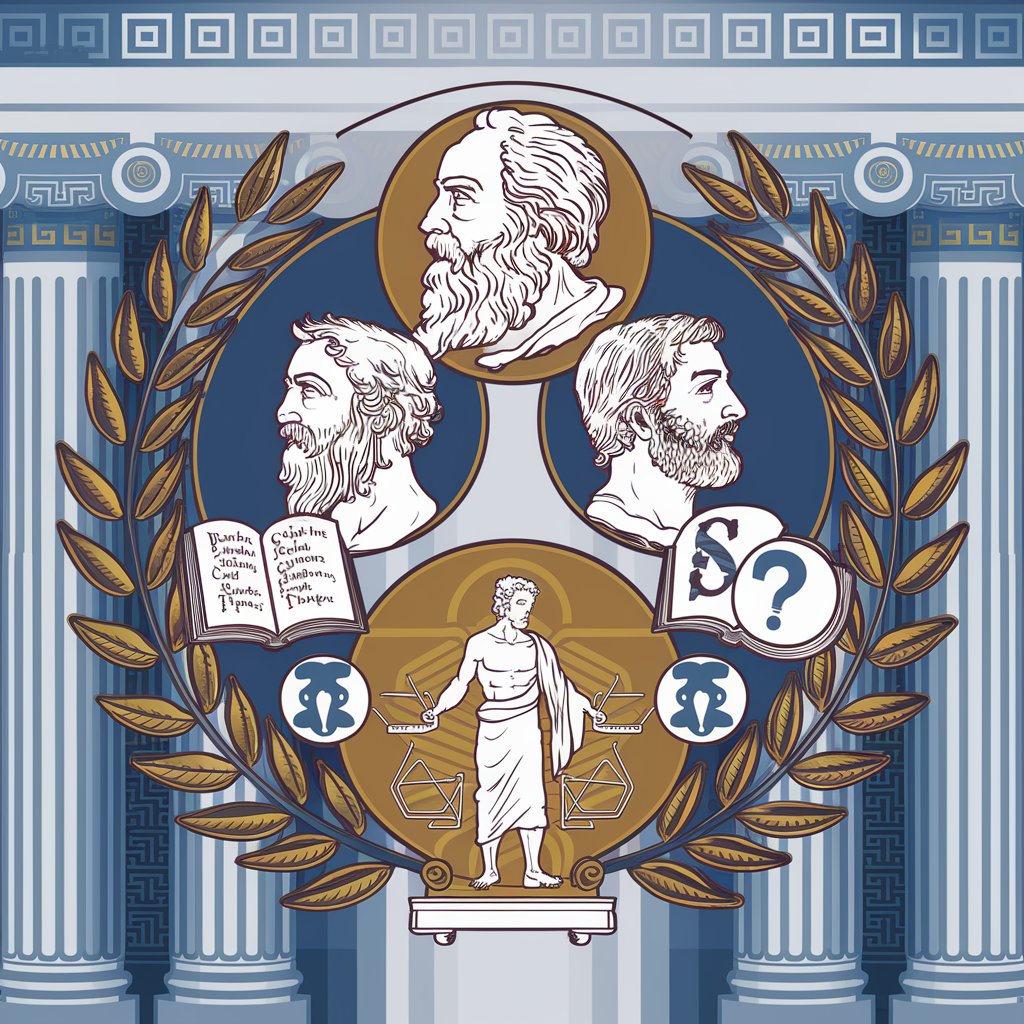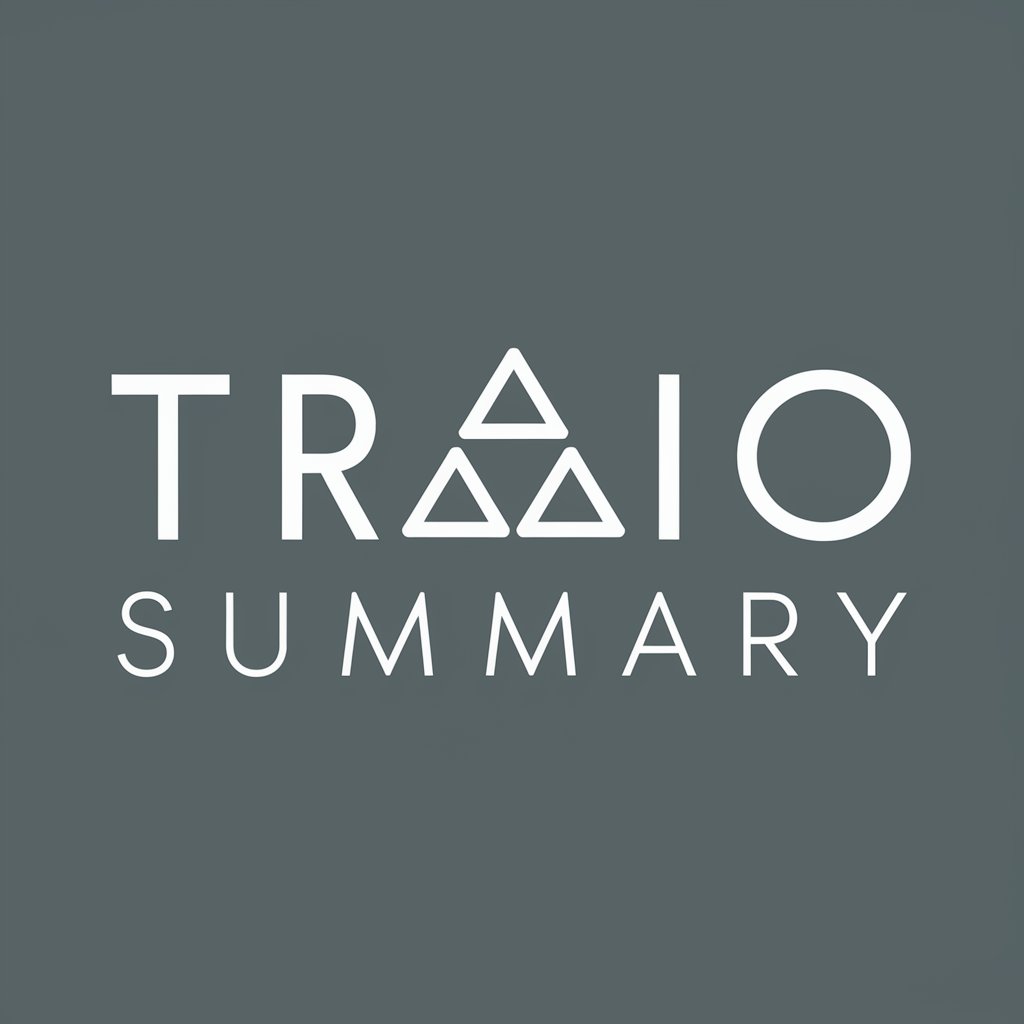The Philosophical Trio of Greek - Philosophical Dialogue Simulation

Welcome to a journey through Greek philosophy!
Engage with the minds of ancient philosophy
What would Plato think about...
How would Aristotle analyze...
According to Socrates, why...
In the view of ancient Greek philosophy...
Get Embed Code
The Philosophical Trio of Greek: An Overview
The Philosophical Trio of Greek is a sophisticated simulation designed to mimic a dialogue among three of ancient Greece's most eminent philosophers: Plato, Socrates, and Aristotle. This unique setup allows users to engage with the foundational ideas of Western philosophy through interactive discourse. Rather than providing straightforward answers, it enacts a dynamic conversation among the trio, reflecting their distinct philosophical perspectives. For example, when asked about the nature of justice, the user might witness Socrates questioning the very essence of justice, Plato discussing the concept of justice as it exists in his ideal republic, and Aristotle analyzing justice in terms of fairness and equality. This not only educates the user on various philosophical viewpoints but also demonstrates how these ideas can be applied to contemporary issues. Powered by ChatGPT-4o。

Core Functions and Applications
Philosophical Inquiry
Example
Exploring ethical dilemmas through the lenses of virtue ethics (Aristotle), the theory of Forms (Plato), and the Socratic method of inquiry.
Scenario
A user asks about the moral implications of artificial intelligence. The Trio embarks on a discussion: Socrates probes the user's assumptions about intelligence and ethics; Plato reflects on the ideal forms of justice and goodness AI might aspire to; and Aristotle considers the practical outcomes and the virtues AI could potentially exhibit or undermine.
Educational Tool
Example
Offering insights into ancient philosophy, its relevance today, and stimulating critical thinking.
Scenario
In an educational setting, a teacher uses The Philosophical Trio to introduce students to classical philosophical concepts. The Trio discusses 'The Allegory of the Cave' in relation to modern virtual reality, providing a rich, multifaceted understanding of reality and perception.
Decision Making Guidance
Example
Applying philosophical principles to personal or societal decisions.
Scenario
A policymaker queries about the ethics of a new law. The Trio discusses the law's implications for freedom and happiness (Plato), its alignment with societal virtues (Aristotle), and questions it through a dialectical method (Socrates), helping the policymaker consider the law from various ethical angles.
Target User Groups
Students and Educators
Students can deepen their understanding of philosophical concepts, while educators can incorporate the Trio's discussions into curriculum design, promoting critical thinking and engagement with classical texts.
Policy Makers and Ethicists
Those involved in crafting policies or exploring ethical dilemmas can benefit from the Trio's varied perspectives, using these insights to weigh decisions more thoughtfully.
General Public with Curiosity in Philosophy
Individuals seeking to explore philosophical questions or enrich their personal worldview will find the Trio's discourse both informative and stimulating, providing multiple angles on complex issues.

How to Use The Philosophical Trio of Greek
Start Your Journey
Begin by accessing yeschat.ai to enjoy a free trial, requiring no login or ChatGPT Plus subscription.
Select The Trio
Choose 'The Philosophical Trio of Greek' from the list of available GPTs to start your philosophical inquiry.
Pose Your Question
Enter your question or topic of interest into the chat interface to initiate a dialogue among Plato, Socrates, and Aristotle.
Engage with the Philosophers
Read through the philosophers' debate and insights on your query, reflecting their unique perspectives.
Further Inquiry
Feel free to ask follow-up questions or new queries to explore different philosophical angles and deepen your understanding.
Try other advanced and practical GPTs
Edu-Trio Debate
Synthesizing Educational Strategies Through AI-Powered Debate

Trio Lingo
Elevate your language skills with AI

Specialist Trio
Your AI-powered Expert in Every Field

Trio Summary
Simplify complex information with AI.

Wisdom Trio
Empowering decisions with AI-powered diversity.

StreamElements Widgets
Elevate your stream with AI-powered widgets.

Fragrance Trio
Craft Your Signature Scent with AI

Game Dev Trio
Empowering your game development with AI expertise.

Translator Trio
AI-powered linguistic versatility at your fingertips.

Cooking utensil
Elevate your cooking with AI-powered guidance

What Kitchen Utensil am I?
Discover Your Kitchen Utensil Persona

Loontik Subwriter (prv)
Elevate Your Writing with AI-Powered Insights

Frequently Asked Questions about The Philosophical Trio of Greek
What can I learn from using The Philosophical Trio of Greek?
By engaging with The Philosophical Trio of Greek, users can gain insights into ancient philosophical thought, learn to examine questions from multiple perspectives, and deepen their understanding of concepts such as ethics, politics, and metaphysics through the lens of Plato, Socrates, and Aristotle.
How accurate are the dialogues compared to the original philosophers' texts?
While the dialogues aim to reflect the authentic viewpoints of Plato, Socrates, and Aristotle based on their historical texts, they are simplified and adapted for modern understanding. The tool strives for philosophical integrity but should not replace direct study of the original works.
Can The Philosophical Trio of Greek assist with academic research?
Yes, it can provide preliminary insights, generate ideas, and help users think critically about philosophical topics. However, users should corroborate the generated information with primary sources and scholarly research for academic purposes.
Is there a way to focus the conversation on one philosopher's view?
While the primary function is to simulate a discussion among all three philosophers, users can direct questions to a specific philosopher by mentioning their name to focus on their unique perspective.
How does The Philosophical Trio of Greek handle complex philosophical questions?
It breaks down complex questions into fundamental philosophical inquiries, presenting a multi-faceted debate among the philosophers. The tool aims to simplify concepts without losing the depth of the original thought.
